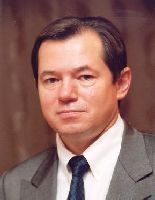In exclusive interview, Putin advisor Sergei Glazyev indicates Okinawan Bases, “Impediment for Russo-Japanese relations,” indicates a harmful subordination to the U.S.

Sergei Glazyev
October 7, 2019 Ryukyu Shimpo
Tsuyoshi Arakaki
Sergei Glazyev, a top economic advisor to Russian President Vladimir Putin, gave an exclusive interview to the Ryukyu Shimpo October 6, in which he commented on issues and hopes for Russo-Japanese relations, as well as other topics such as the possibilities for Okinawa.
Glazyev indicated that the northern territories dispute is a, “major impediment” to Russo-Japanese relations, and that, “Modern Japan is an autonomous, independent and powerful nation, and is able to pursue international diplomacy independently for the benefit of their own country.”
He added that escaping from subservience to the U.S. was essential to improving Russo-Japanese relations, and raised the U.S. military bases in Okinawa as a key factor, stating, “[Japan must] shed the legacy of defeat and U.S. occupation that includes the U.S. bases in Okinawa.”
This exclusive interview is the first that Glazyev has given to the Japanese media. He answered the interview request in late September as an advisor to the president.
On October 2, Glazyev was appointed the Minister of Integration and Macroeconomics of the Eurasian Economic Commission (EEC) an economic alliance of five countries that includes Russia and Belarus.
As someone who wields great influence over things such as effective future Russo-Japanese relations, his perception that the U.S. bases in Okinawa as a major impediment could affect future negotiations between Japan and Russia.
During previous negotiations around the northern territories dispute and the Russo-Japanese Peace Treaty, Putin has referred to the details concerning the Japanese issue of the relocation of MCAS Futenma to the Henoko neighborhood in Nago.
Putin indicated, “Construction continues despite the opposition of residents and the governor,” and also noted that the U.S. military was constructing facilities in other regions of Japan, expressing concern over the effect this could have for Russian national security.
Glazyev’s views on the matter seem to be based on the same concerns recognized by Putin.
Glazyev stressed that the political tensions brought about by the northern territories dispute was a, “major impediment” to promoting a cooperative relationship between Japan and Russia.
He indicated that Japan’s diplomatic policy of their claim in the northern territories dispute was born of a seed planted by, “The American GHQ” (the Supreme Commander for the Allied Powers, or SCAP, who administered the occupation of Japan after World War 2), and that “Even now, the U.S. is watching very closely to ensure that the Japanese government does not stray from this course.”
Additionally, he added, “Japan needs to escape the anti-Russian stance created by Washington,” once again touching on the U.S. bases in Okinawa as a symbol of the relationship between the three countries.
Glazyev also praised Okinawa’s potential as a tourism destination due to contributing factors such as being blessed with a great climate and natural environment, state-of-the-art healthcare, and excellent service, stressing, “I have no doubt that by developing some effective advertising, [Okinawa] can become a hotspot for Russian Tourists.”
(English translation by T&CT and Sam Grieb)
Previous Article:World Natural Heritage Site evaluations in Okinawa
Next Article:Violinist from Okinawa returns to her hometown to perform
[Similar Articles]
- Russian government officials and mayors making advances toward Okinawa
- U.S. informs Russia of plans to deploy intermediate-range missiles to Okinawa in the next two years, worrying some that the base burden will increase significantly
- H.I.S. to operate flight between Naha and Russia next May
- First Russia-Okinawa charter services launched
- Chinese ambassador to Japan insists upon the peaceful settlement of the Senkaku Islands dispute
 Webcam(Kokusai Street)
Webcam(Kokusai Street)


